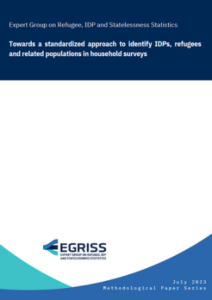 JIPS is a long-standing member of the Expert Group on Refugee, Internally Displaced Persons and Statelessness Statistics (EGRISS). After the endorsement by the UN Statistical Commission of the International Recommendations on Refugees and IDP Statistics, JIPS has been actively supporting the Expert Group in the development of further methodological guidance for National Statistical Offices, humanitarian and development actors to include internal displacement in national statistics and harmonise methodologies with operational IDP data systems.
JIPS is a long-standing member of the Expert Group on Refugee, Internally Displaced Persons and Statelessness Statistics (EGRISS). After the endorsement by the UN Statistical Commission of the International Recommendations on Refugees and IDP Statistics, JIPS has been actively supporting the Expert Group in the development of further methodological guidance for National Statistical Offices, humanitarian and development actors to include internal displacement in national statistics and harmonise methodologies with operational IDP data systems.
Until recently, there was no standard approach to identifying IDPs and refugees in household surveys globally. As a result, it was difficult to compare results from different data collection exercises, both within and between countries. This lack of a standard identification approach has impeded the production of official statistics on IDPs. The EGRISS working group on methodology and guidance, led by Joint Data Center on Forced Displacement and the UN Agency for Refugees, recently introduced a Methodological Papers Series with the aim of developing methodological hands-on guidance to support the implementation of the three International Recommendations on Refugee, IDP and Statelessness Statistics.
The first EGRISS methodological paper, with key contributions from JIPS, seeks to describe all the elements of the IDP definition as per the IASC Framework on Durable Solutions and how these elements can be captured in a survey questionnaire. It includes:
The aim of this paper is to provide National Statistical Offices and other data collection agencies around the world that are seeking to provide more and better statistics on IDPs and refugees with an easily accessible questionnaire module that can be used in existing surveys. There are several global processes that are asking for more statistical information on IDPs, from the 2030 Agenda for Sustainable Development to the United Nations Secretary-General’s Action Agenda on Internal Displacement. At global level, EGRISS is already promoting the inclusion of these identification questions in major international survey programs such as the Multiple Indicator Cluster Survey (MICS). At country level JIPS is working with partners to achieve the same, with Somalia being a possible pilot country for the inclusion of IDP identification questions in upcoming national surveys. Building on the International Recommendations for IDP Statistics (IRIS) and the International Recommendations for Refugee Statistics (IRRS), this new paper will surely contribute towards the production of more and better statistics on these vulnerable and often invisible population groups to achieve the 2030 Agenda for Sustainable Development promise of Leaving No One Behind.